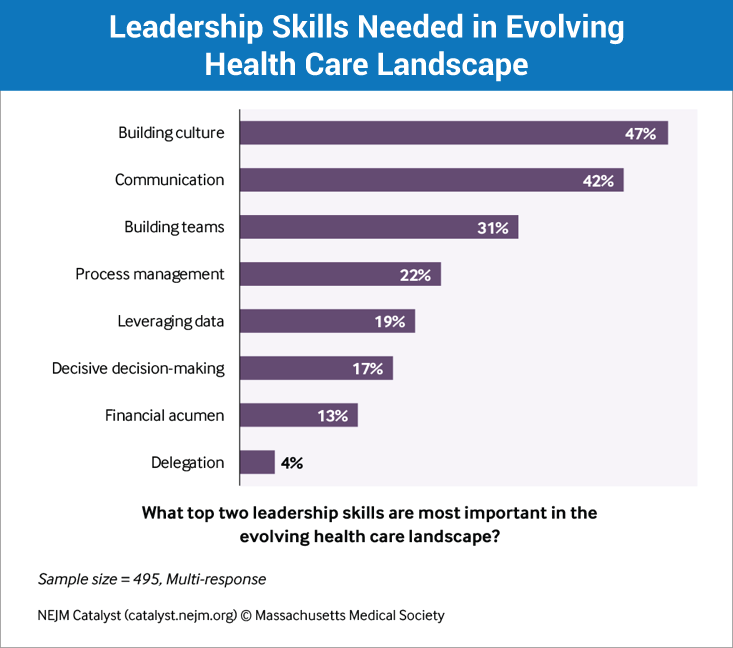What leaders think
What is the most important skill that health care leaders need? In a recent survey, NEJM Catalyst invited 495 health care clinicians and leaders to answer that question. Their answer: building culture.

Building culture is more important than the long valued skills of delegation, financial acumen, leveraging data, and decision-making.
Why is building culture top of mind for so many? Thought leaders pointed to several factors:
- The shift toward team and value-based care delivery.
- The need to satisfy differing and sometimes competing priorities of patients, payers, providers, and employers in delivering what each defines as value.
- The ever-expanding body of external measures of success (quality and outcome measures) in the delivery of care, combined with the pressure to consistently improve performance.
- The need to empower problem solving at the front lines of care delivery.
How Utah builds culture
With these changes (and more) colliding in health care delivery, the need to build culture is clear. But how does one actually do it? Building culture is spoken of abstractly, with specific skills difficult to nail down.
At Accelerate, we see individuals building culture everywhere. Culture builders are in the trenches actually trying, failing, and trying again to lead change. Experience is gained in real time. The challenge is to translate that experience into knowledge and spread it.
| Principle* | Skill | See It Applied | |
|---|---|---|---|
| Vision (why & how) | Aligning and prioritizing work | ||
| Team | Influencing others | ||
| Patient | Designing with patients in mind | ||
| Measure | Using data |
|
* The 4 principles of Vision, Team, Patient, and Measure are drawn from Utah's Vision Summary (outlined in Dojo #2). The Vision Summary is list of 13 questions that guide value improvement leaders through 4 common cultural drivers of improvement success.
Chrissy Daniels
To disagree means failing to agree. Synonyms include to contradict, challenge or debate. Synonyms do not also have to include to argue, quarrel, dispute, bicker or clash. Pediatric intensivist Jared Henricksen shares the best path forward when words become clouded with emotion.
Your social media feeds are awash with tips for working from home, but how do you lead from home? Karen Wilson and Dawn Newberry, of University Medical Billing, have led remote teams for years. Their experience boils down to one principle: build and maintain connection.
Fail fast and often has been Silicon Valley’s motto for years. For medicine, where failure can result in patient harm, failure has negative connotations. Peter Weir, Utah’s executive medical director of population health and a family medicine physician, discusses different types of failures, and how we become better people and better clinicians by talking about our mistakes.
